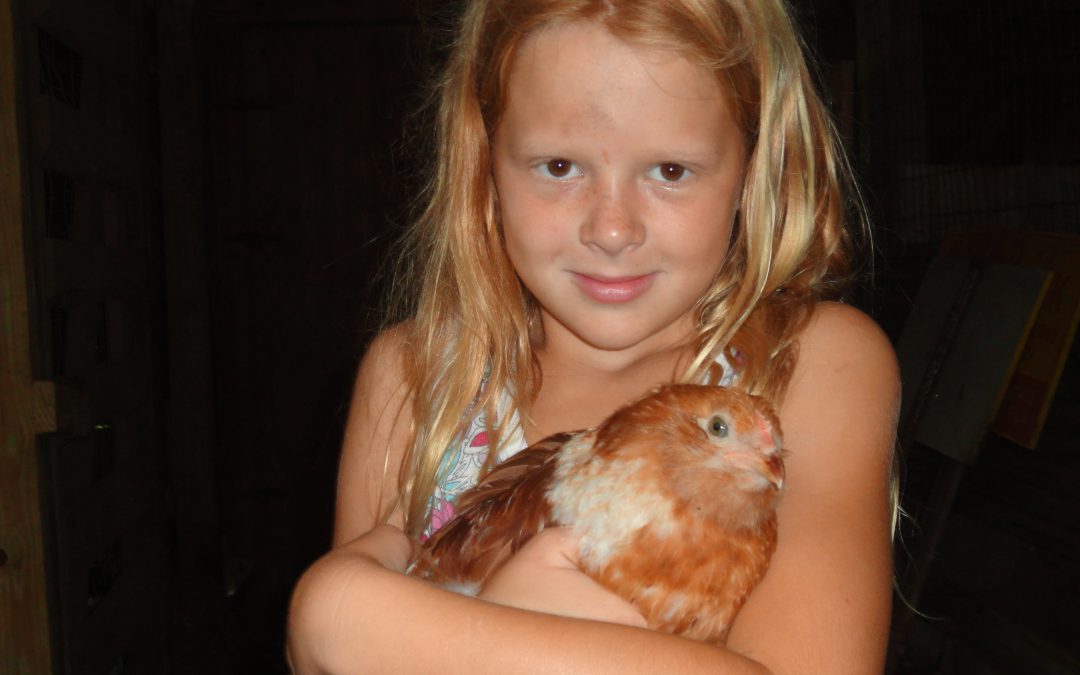
by Julie Pigott Dillard | Sep 13, 2019
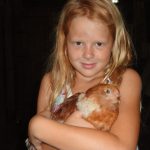
Learning responsibility is just one of the many skills learned through 4-H Chick Chain.
Since March, 4-Hers have watched their chicks grow day by day into pullets. Spanning six months, the 4-H Chick Chain project teaches youth how to care for growing chickens. They’ve learned all about nutrition, housing needs, and disease management along with showmanship preparation and practices. Youth kept project books of their experiences, taking note of expenses, and breed information. Youth who participated in the past 2018 project have continued to care for their chickens who are now laying eggs and providing a food source for their family.
On September 28th, youth will participate in the 2019 4-H Chick Chain Show. For 2019 projects, youth will exhibit two of their best project pullets (a pullet is less than one year old at laying age), participate in showmanship to show off their handling skills, and enjoy a skill-a-thon to show what information and knowledge they’ve learned during the year. For 2018 projects, those youth will bring their two best layers which are now in peak egg production.
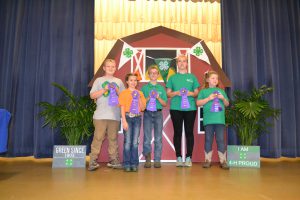
Best of Breed winners from the 2018 4-H Chick Chain
2019 4-H Chick Chain Show Details
For youth participating in the 2019 4-H Chick Chain Show, remember to register through your 4HOnline profile by midnight, September 13th. Your project book and photography entries are also due to your 4-H agent that day.
Youth will earn awards in skill-a-thon and showmanship. Awards will be given to best of breed and overall champions will be named.
Here’s a timeline of events for the 2019 4-H Chick Show:
Saturday, September 28, 2019
Washington County Ag Center – 1424 Jackson Ave, Chipley, FL – check-in on the west end of the building.
- If your flock is NPIP certified, bring your card to check-in
- 8-8:30 am – District II Check-in (Walton, Washington)
- 9-9:30 am – District III Check-in (Leon, Liberty, Jefferson, Wakulla, Franklin, Gadsden)
- 10-10:30 am – District I Check-in (Escambia, Okaloosa, Santa Rosa)
As soon as birds are checked-in, youth will participate in showmanship and skill-a-thon with awards tentatively scheduled for 12 pm.
Resources:
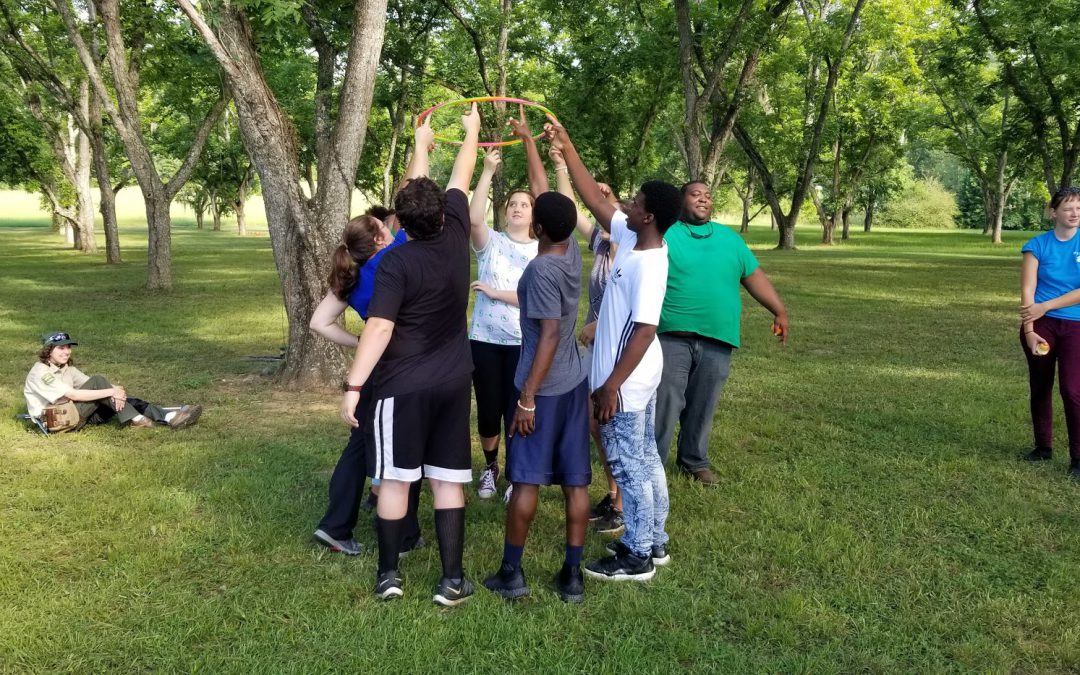
by Marcus Boston Jr. | Aug 2, 2019
Summertime is typically associated with summer vacations, sleeping late, fast foods, rainy days, hot afternoons, and one 4-H camp after the other. Some would argue that summer camps are simply an advanced “day care” program for parents to drop their kids off to “play” so they can be productive at work without worrying about their children. However, research shows that youth who attend camps during the summer come away with so much more than what camping programs are given credit for.
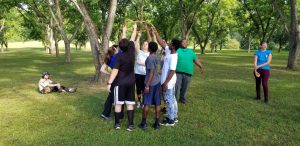
Camp Counselors at Wildlife Camp doing a team building activity.
For many youth, traditional summer camp means no homework, no tests, lots of recreation, camp songs, crafts, and lots of swimming. While these are typical camp activities that normally take place during a week of camp, these experiences have a two-fold purpose in that they also serve as a vehicle for significant learning to take place. Many parents are concerned about the amount of knowledge that kids lose during the summer. There has been substantial research that shows students can lose up to 3 months of what has been learned during the school year. By keeping young people’s brains active, acquiring new skills and knowledge, camp offers the chance to decrease the typical summer learning deficit. How is this done??……I’m glad you asked!
4-H is intentional in providing critical components of a successful learning experience as part of all its summer camp curriculum. These Essential Elements are: Belonging, Independence, Mastery, and Generosity. They are designed to meet the developmental needs of youth. Let me give you some examples.
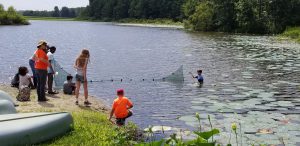
4-H campers seining in Lake Lafayette for aquatic specimens
4-H Camp attendees experience a sense of Belonging, the first Essential Element, during cooling off time at 4-H Camp Cherry Lake, while being cared for by camp staff, counselors, and 4-H Youth Development Professionals. Campers enjoy being in a safe place with their peers without a fear of being bullied. 4-H accepts youth where they are and helps them ignite the spark that exist within them, enabling them to reach their potential.
With no parents on the camp grounds telling their children what to do and when to do it, Independence, the second Essential Element, is a key element that a residential or day camp provides for its attendees. Providing the opportunity for youth to be independent thinkers and to better understand themselves develops at camp as youth learn to make decisions based on experiences and knowledge obtained during camp.
In order to develop the self-confidence needed for youth to feel they can be successful, camp provides many opportunities for Mastery, the third Essential Element, to take place. Whether it is passing the swim test, learning a new skill, or leading a game, having that “I can do this” moment for a camper can make a positive impact on a young person’s life.
Lastly, 4-H camps provide opportunities for youth to learn the importance of Generosity, the fourth Essential Element, by learning and working with campers from diverse backgrounds and different socio-economic levels. Camp could very well be the first time they have spent an increased amount of time with people whose background, race or religion is different from their own. Through planned program curriculum consisting of team building and get acquainted activities throughout the week, the campers learn to focus on what they have in common and to value the contributions of others who may not look or act like them.

Cooling off time at 4-H Camp Cherry Lake
So being away from home, making new friends, being a part of a team, and trying new things are key building blocks to obtaining a successful experience to meet the developmental needs of youth. 4-H summer camp provides youth the platform to create great memories and lasting relationships that can last a lifetime.
For more information on how your youth can participate in 4-H camps, find your local UF IFAS Extension Office and contact your 4-H Agent to explore what programs are offered in your area.
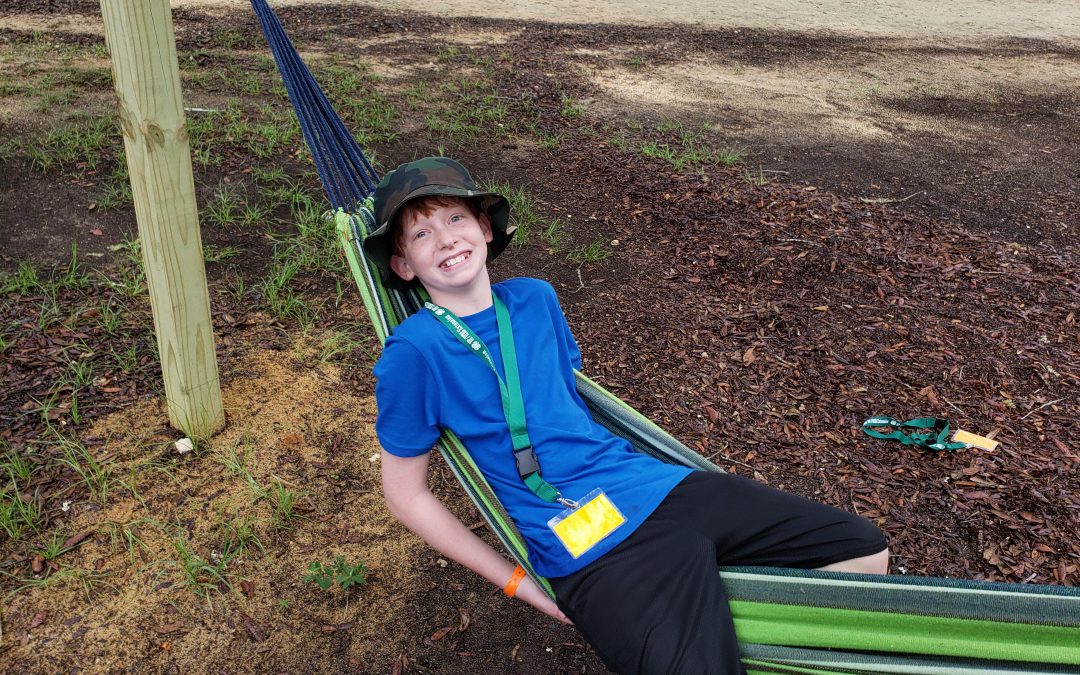
by Rachel Pienta | Jul 19, 2019
Exploring New Activities with 4-H Club and Camp
When Chase Weston arrived at a meeting of the Panacea 4-H Explorers Club for the first time, he was not sure he wanted to be there. Chase’s normal activities of choice included reading and playing video games. He rarely played with other children and did not usually enjoy playing outdoors.
The Panacea 4-H Explorers Club meets weekly and offers youth the opportunity to sample activities ranging from painting and cooking to outdoor skills. Members march in parades and volunteer together at community events.
Getting Active With Archery
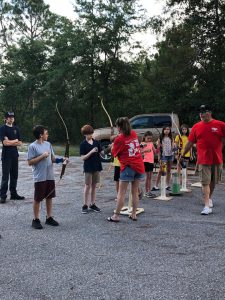
Chase receives archery instruction from Club Leader Trena Gooding.
From that first day attending an Explorers Club meeting, during his time with 4-H, the once very reserved and quiet boy has undergone a dramatic transformation. This summer, Chase had the opportunity to participate in a two day archery summer camp. On the first day, he did not want to participate and asked to go home. On the second day he started to warm up to archery and by the end of the day he did not want the camp to end!
Club Leader Rhonda Lundy said, “I have seen a drastic change in Chase through his participation in 4-H. He is definitely trying things outside his comfort zone and his parents couldn’t be happier.” Chase accepted the opportunity to attend Camp Timpoochee with support from a 4-H state scholarship. During his week at camp, Chase enjoyed activities like dance class and kayaking. He was able to continue with his newfound love for archery during residential camp.
Happiness in a Hammock at Camp
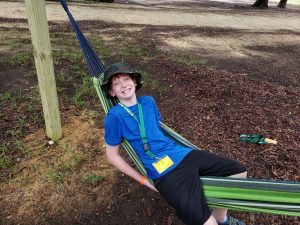
Chase enjoys free time in a hammock at Camp Timpoochee.
While he has stepped outside his comfort zone and tried many new activities during the week, Chase declared his favorite thing at Camp Timpoochee was enjoying the view from the vantage point from one of the many hammocks strung between trees throughout camp.
Links to Resources
For more information on how your family can participate in 4-H, find your local UF IFAS Extension Office and contact your 4-H Agent to explore what programs are offered in your area.
Benefits of Summer Camp
Camp Choices with 4-H
Youth Development Outcomes of Camp Experiences
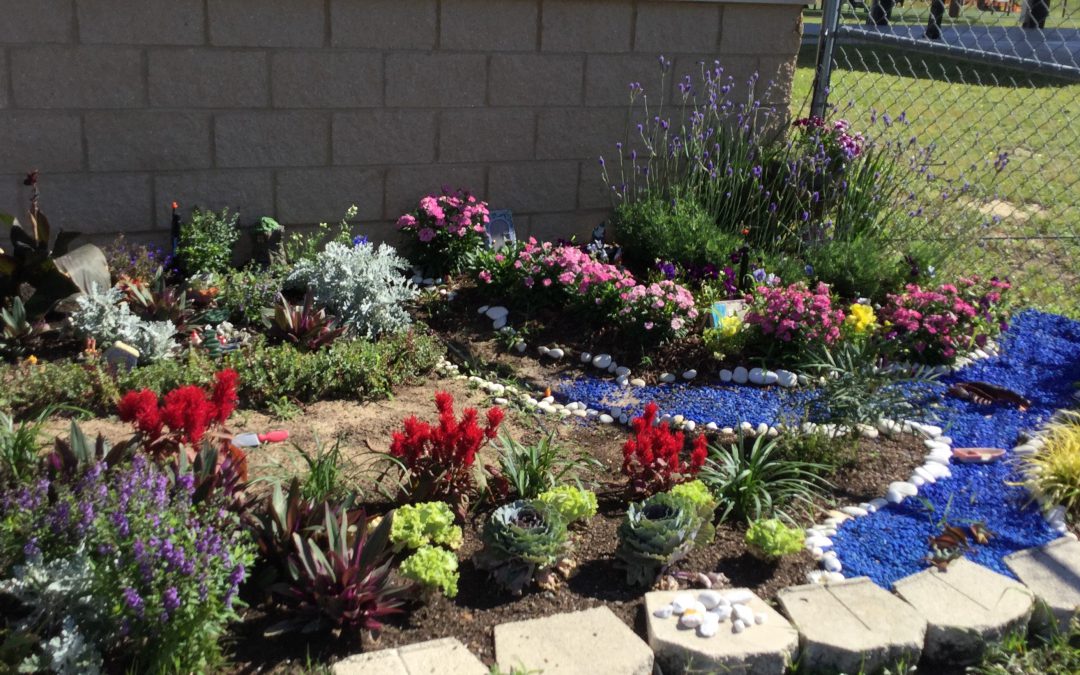
by pmdavis | Jul 5, 2019
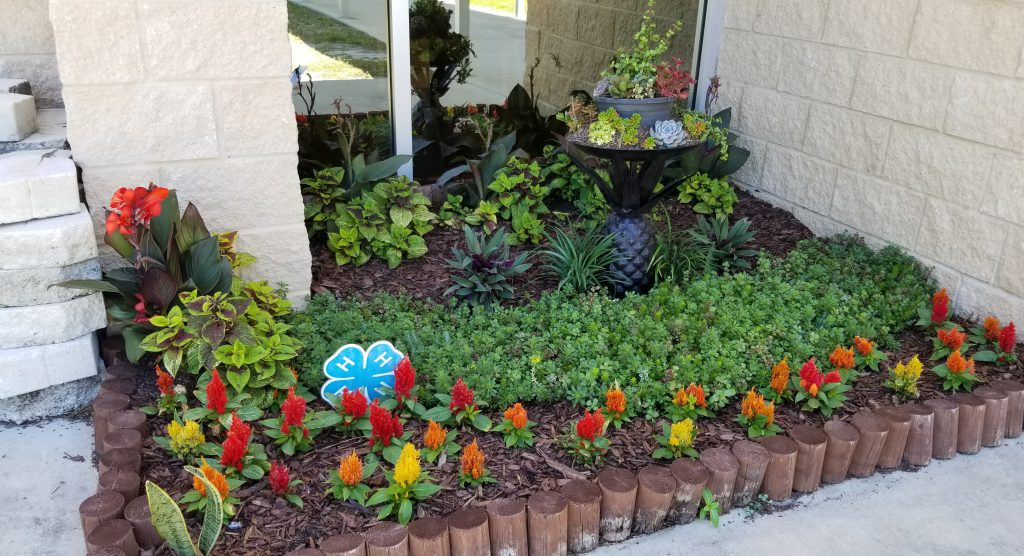
Succulent garden at entry of NSA-PC Youth Center
In September 2018, Ms. Bettina started the 4-H Garden Club at NSA-PC in Panama City, Florida. She had big plans for the garden and couldn’t wait to get started. These Navy youth, led by a caring adult staff member, started their 4-H journey. Then Hurricane Michael came, which devastated the area on October 10, 2018 and could have easily derailed all of their plans. Instead, the storm allowed youth to start with a clean slate and a renewed sense of vigor in rebuilding the garden at the NSA-PC Youth Center. The youth redesigned some of their beds using debris from the storm.
When the Youth Center reopened following the storm, most of the outdoor areas were off limits to the kids due to damage from the storm. That meant that the playground and other outdoor activities were not available. However, the 4-H Garden Club was allowed to function and allowed the youth itching to be outside and yearning for a way to cope with the devastating effects of Hurricane Michael to come together as a team and, along with Ms. Bettina, a garden to restore a sense of balance and ownership.
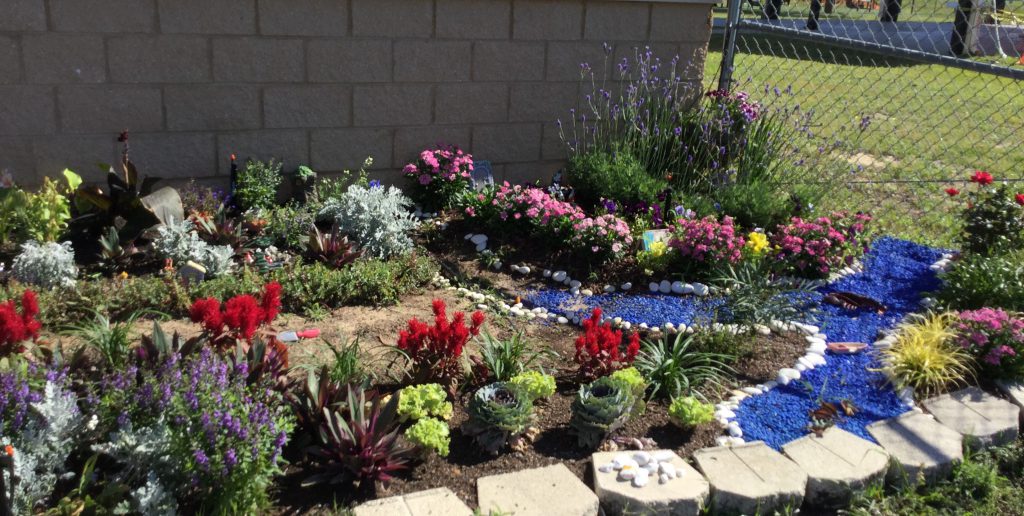
Whimsical garden bed designed by NSA-PC youth
The kids were eager to get started planning, implementing, and maintaining the new garden area. They created a plan for different types of gardens within their facility spaces. They researched which plants were best suited for the season and zone as well as which flowers would attract pollinators, because they hoped to see hummingbirds and butterflies. Ms. Bettina says that the kids came in every day asking if they were going to get to work in the garden. It created a healthy, active, and creative outlet for all involved. Soon the garden began to take shape with imaginative details and originality everywhere you looked.
All visitors to the Youth Center are welcomed by exquisitely maintained flower beds that surround the entrance to the building. The youth have created and maintained a beautiful area that enhances the building and greets visitors with beauty and color. These raised gardens are filled with hardy greenery as well as seasonal color and elevated containers that hold a cascade of many varieties of succulents.
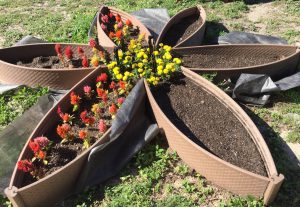
NSA-PC youth recycled old materials to create a new space to hold their flowers.
The 4-H Garden Club at NSA-PC is a perfect example of how sometimes a storm that seemingly derails plans actually presents an opportunity for growth, learning, and creating something more beautiful. Ms. Bettina’s 4-H Garden Club could not have come at a more perfect time. The gardening activities allow the youth to get outdoors while learning about different types of plants and how to care for them. Many students initially joined the Garden Club to get outside after the storm due to the playground closure. Youth participating in the 4-H Garden Club at NSA-PC have learned about more than just the science of plants; they are learning to work as a team with improved communication skills in order to continue maintaining their garden as well as environmental awareness and recycling by taking used items to make new treasures for their flower beds.
4-H is one of the nation’s most diverse organizations and includes people from all economic, racial, social, political, and geographic categories. There are no barriers to participation by any young person. Participants are given the opportunity to engage in activities that hold their personal interests while being guided by adult volunteers. If you would like to learn more about 4-H programming in your local area, or how to get involved as a 4-H volunteer, please contact your local UF IFAS County Extension Office, or visit http://florida4h.org.
RESOURCES
For more tips and ideas to help build your personal garden, visit http://edis.ifas.ufl.edu/ as there are many documents available to help build your personal gardens.
This article was written by Jennifer Sims and Paula Davis.
by Niki Crawson | Jun 21, 2019
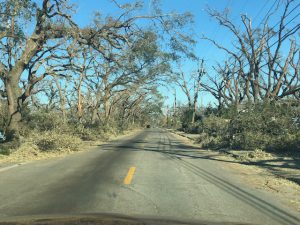
Street view of Hurricane Michael damage. Photo by Melanie Taylor.
Do you enjoy building structures and figuring out problems? If so, the 2019 STEM Day Camp is for you. The day camp theme is Building for Hurricanes: Engineering Design Challenge. The day camp will be held July 22-24 at the Jackson County Extension Office, 2741 Penn Ave. Suite 3, Marianna, FL 32448 from 9am CT – 2pm CT. The cost is $30; space is limited. Pre-registration is required at https://florida.4honline.com/.
In order to prepare for the day camp final competition, teams will become familiar with engineering, hurricane damage and natural disasters. In the engineering design challenge, students build a tower to resist a simulated hurricane.
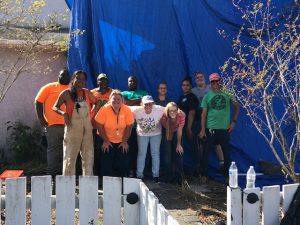
Jefferson Co 4-Hers and volunteers helping clean up after Hurricane Michael. Photo by Paula Davis.
- The curriculum guide being used to teach the day camp includes, background information, examples and sample activities to help prepare the teams for the final competition.
- Teams will demonstrate their hurricane ready structure for the judges and audience, and then give reasons. They must plan and build a tower as tall as possible that will hold up a tennis ball while resisting the force of wind from a fan. For an extra challenge, a spray bottle will be used to simulate rain. After the towers are built, the group comes together to test them. Adults will not be able to assist members with the design.
- All tools and supplies will be provided.
After the day camp, you can continue this challenge and further expand your engineering skills at the North Florida Fair STEM judging event on 4-H Day at the Fair, November 16, 2019.
If you would like to learn more about this 4-H STEM Day Camp, 4-H Day at the Fair, additional 4-H day camps and programs in your local area, or how to get involved as a 4-H volunteer, please contact your local UF IFAS County Extension Office, or visit http://florida4h.org.
by Niki Crawson | Jun 14, 2019
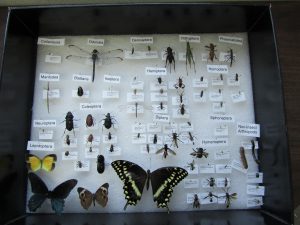
Collecting and pinning insects are just some of the fun things we will be doing at entomology camp.
We’re revving up for the NW 4-H District Exciting World of Insects Day Camp set for July16-18. At this camp, youth from counties across the district will come together to learn everything from what an insect is, to insect parts and orders, and how to collect and pin insects, and create insect art.
This camp is a great springboard to competitions and events later in the year. By participating in this day camp:
- Participants will leave the camp with all of the supplies they need to continue collecting and pinning insects on their own
- Collections and art projects can be entered in local fairs and in the state 4-H contests
- Participants will also be ready to compete in the state 4-H Insectathon insect ID, skillathon, and quiz bowl contests and in county and district demonstration contests
Stay tuned to our Facebook page for pictures and follow-up from camp. If you’d like to learn more about 4-H day camps in your area, please contact your local UF IFAS County Extension Office, or visit http://florida4h.org.

















